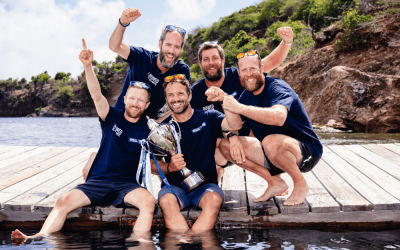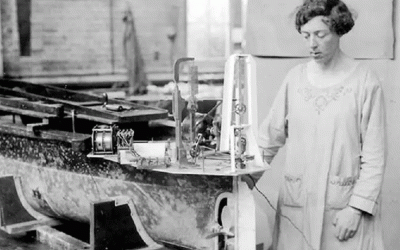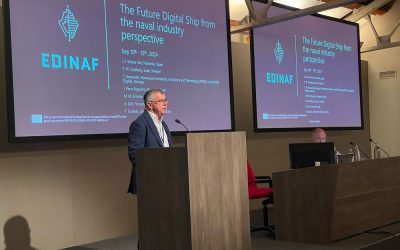The Naval Architect January 2021 – Green Shipping supplement
 Formed last year, the Mærsk Mc-Kinney Møller Center for Zero Carbon Shipping is an independent organisation launched in June 2020 with the stated aim of helping to accelerate the transition, eventually leading to new fuel types and technologies. The non-profit research center has been founded by several leading industry players – ABS, A.P. Møller – Mærsk, Cargill, MAN Energy Solutions, Mitsubishi Heavy Industries, NYK Line and Siemens Energy with the help of a grant from the A.P. Møller Foundation.
Formed last year, the Mærsk Mc-Kinney Møller Center for Zero Carbon Shipping is an independent organisation launched in June 2020 with the stated aim of helping to accelerate the transition, eventually leading to new fuel types and technologies. The non-profit research center has been founded by several leading industry players – ABS, A.P. Møller – Mærsk, Cargill, MAN Energy Solutions, Mitsubishi Heavy Industries, NYK Line and Siemens Energy with the help of a grant from the A.P. Møller Foundation.
In November, the Center’s chief executive officer, Bo Cerup-Simonsen, presented RINA’s annual President’s Invitation Lecture on the subject of decarbonisation, as an introduction to the work the company plans to undertake. He explains: “The starting point for the Center was a discussion whether it would be possible to put into the mix an activity that would accelerate the transition towards decarbonisation of shipping… acknowledging that a lot of good activities and collaboration are ongoing with developments on the private and public side."
The complexity and scale of the challenge means that no single company can achieve this alone and the Center sees its role as facilitating collaborations, by the setting up of a centralised team that can develop a clear strategy, while connecting shipping with the onshore infrastructure of new energy types. Although the focus will be on technical developments, Cerup-Simonsen stresses that the regulatory, commercial and financial aspects of the industry need also be crucial in developing scalable solutions.
Decarbonisation pathways
The Center has started by mapping out the different pathways and technology options for decarbonisation, both with regard to the fuel supply chain and onboard operations. Each of these will need to be assessed in what Cerup-Simonsen describes as a “robust manner” in order for regulators and investors to determine their viability for different ship types and operations.
Given the growing urgency, the Center’s strategy is focused on achieving acceleration over the next decade, with three major areas for this work identified. Firstly, developing an overview of the viable technology options, with a particular (but not exclusive) focus on the “front runners” among them that merit fast tracking.
Second, to begin building a consensus around the transition strategy that starts increasing demand for these new fuel types, including regulatory and financial instruments which need to be made available. It will also require establishing a portfolio of development and demonstration projects that support that transition strategy.
Cerup-Simonsen points out: “A lot of those projects are ongoing already, so it’s not like the industry is starting from scratch. There’s a lot of work to build on here and it’s as much about strengthening and connecting activities which are already ongoing.”
Finally, comes implementation and diffusion; scaling up investments significantly and allowing new ships to be built with zero carbon capability while the existing fleet is also adapted to use new fuel types. “A big part of the solution here is to think in terms of multi-fuel capability, because we’re going to need massive infrastructure and supply developments and most of that is not going to be available by the end of the decade.”
Managing transition
Despite doubts about the viability of some of the proposed fuel solutions, Cerup-Simonsen is confident that decarbonised shipping is possible by upscaling existing technologies. Rather, it’s a matter of ensuring shipowners can transition safely and with confidence from the current fossil fuel-based system to a decarbonised one.
Complementing that are regulatory, financial and commercial levers which the Center also aims to support. To help realise this, it is setting up five to eight dedicated programmes for specific fuel solutions, addressing the entire supply system and onboard vessel systems. For each of these the cost, environmental impact, decarbonisation potential, safety and scalability will be assessed.
Cerup-Simonsen comments: “We’re already working with a lot of players and coalitions, because there’s a lot of good work going on. We have established a scalable operating model where organisations can work with us on the not-for-profit activities without having to disclose proprietary information. So we’re collaborating with organisations globally to set up the guidance and decision support tools to allow the shipping community to understand the opportunities, cost levels and potentials available to the different segments."
The Center’s initial grant of DKK 400m (US$65.1 million) is expected to provide funding for the first three to four years, with 80-100 people based at its Copenhagen headquarters who will be a mixture of permanent employees and those seconded from collaborating organisations. There will also be other staff based around the world with partner companies.
For the full article please see The Naval Architect's Green Shipping supplement.



